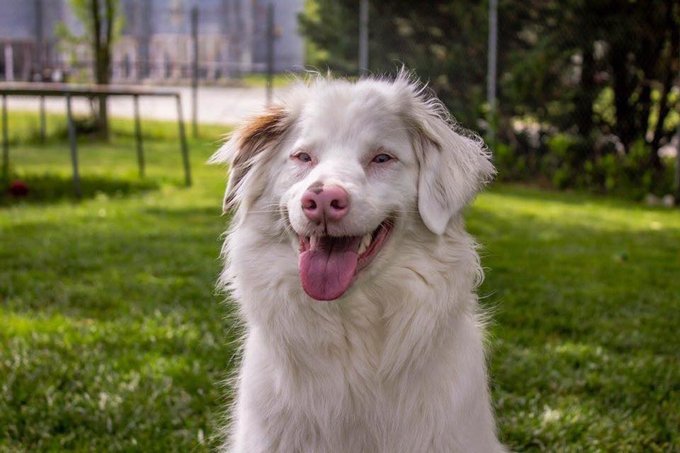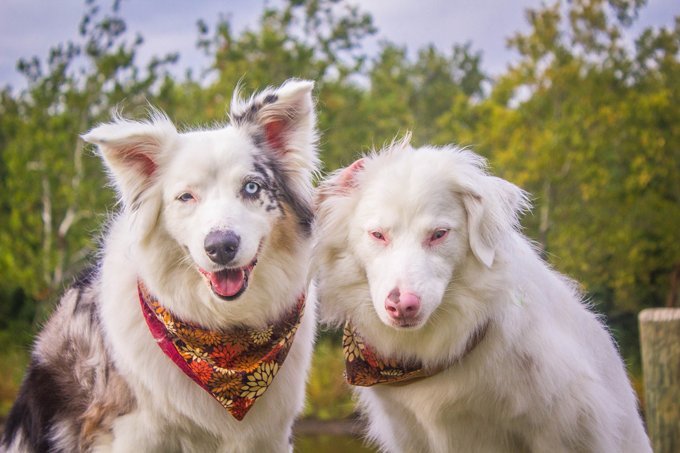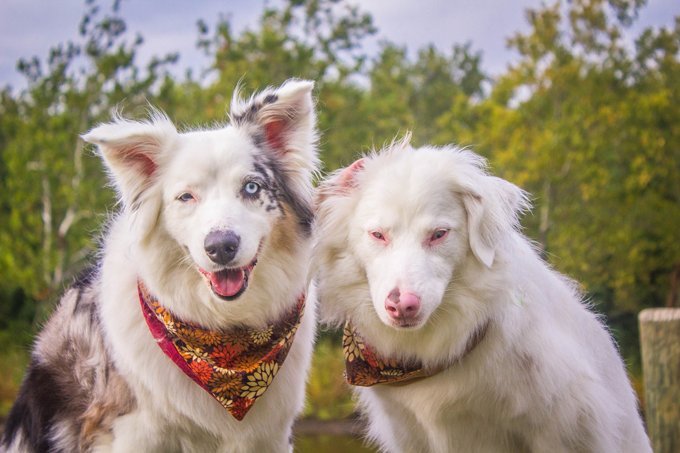
Canine coats come in all sorts of patterns, and the swirling, mottled markings known as merle are pretty and popular. Some breeders will charge more for dogs with merle coats, and aim to increase their profits by breeding merle dogs together — a reckless practice that increases the chances of pigment deficient pups with hearing or visual impairments. These white coated dogs are known as double merles, and May 20 is the second annual Double Merle Awareness Day.
“Double merles are completely preventable and no dog deserves to be born with disabilities,” explains Amanda Fuller, the woman behind the special day for special needs dogs.
Inspired by her own double merle, a deaf Australian Shepherd named Keller, Amanda is is seeking to educate the public about the genetic factors that make merle-to-merle breeding unethical, while also demonstrating what wonderful pets special needs dogs can become.
According to doublemerles.info, when a merle dog breeds with a solid coated dog, the puppies have a fifty-fifty chance of inheriting the merle gene from their single merle parent. When two merle dogs breed, the odds of having merle coated puppies don’t increase, but there is a 25 percent chance a pup will inherit the merle gene from both parents. Doubling up on this gene removes pigment from places where it’s needed — like the ears and eyes — and also results in a white coat.

It was that white coat that first drew Amanda’s eye to a photo of Keller on an online adoption listing four years ago. Just a tiny pup back then, Keller had been saved from a breeder who intended to shoot her because of her colourless coat, odd looking eyes and deafness.
Keller’s origin story is horrifying, but hardly unique. Unable to fetch top dollar for breeders, double merle pups often face euthanization or an uncertain future in a shelter, where their vision and hearing issues hamper their chances for adoption.
Luckily for Keller, Amanda didn’t hesitate to adopt a deaf puppy. She worked hard to train Keller in obedience using only hand signals, and eventually the dog who was nearly killed for her disabilities was outperforming hearing dogs. As Keller grew, so did Amanda’s passion for double merle advocacy.
“Working with Keller, and seeing the way that people react when they find out she is special needs is what keeps me going. After creating a Facebook page for her, and then the non-profit, Keller’s Cause, I still wanted to do more,” she explains.

(Picture Credit: Keller The Double Merle Facebook Page)
The first Double Merle Awareness Day happened May 21, 2016. Pet stores around the country hosted double merle dogs and their humans, who set up displays and chatted with shoppers about life with these pigment challenged pups.
“It was bigger than I ever imagined it would be,” says Amanda, who has high hopes for this year’s turnout. “We hope that when people all over the country are meeting these dogs, their eyes are being opened to the potential a special needs dog can have.”
By setting aside the third Saturday in May each year for advocacy, double merles lovers hope to put a stop to this reckless breeding practice that has already been banned by the UK’s Kennel Club, and maybe even encourage potential adopters to consider a special needs pet.
Amanda and Keller will be spreading awareness at Tractor Supply Co in Hanover, Pennsylvania. To check out events in your state check out the Double Merle Awareness Day Facebook page. If you can’t make it in person, volunteers will be using #dmday17 on social media.









